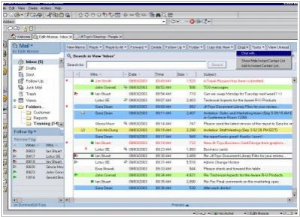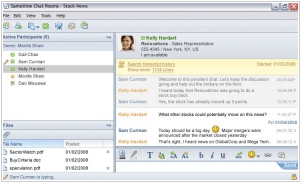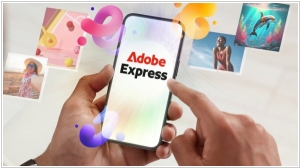HCL Sametime is #9 in Top 10 Unified Communications software
HCL Sametime (formerly IBM Lotus Sametime) is a client–server application and middleware platform that provides real-time, unified communications and collaboration for enterprises. Those capabilities include presence information, enterprise instant messaging, web conferencing, community collaboration, and telephony capabilities and integration.
Positions in ratings
#9 in Top 10 Unified Communications software
Alternatives
The best alternative to HCL Sametime is Microsoft Teams
Latest news about HCL Sametime
2007. IBM follows Microsoft with unified communications push
The competition in the unified communications market intensifies as IBM introduces a new range of collaboration products in partnership with Siemens. This collaboration aims to expand the capabilities of IBM's Lotus Sametime software, including telephony integration software. Meanwhile, Microsoft is gearing up for the launch of Office Communications Server 2007 on October 16, targeting larger enterprises, while also planning to offer unified communications as an on-demand service for smaller businesses. Unified communications bring together various communication channels and applications, enabling easier and more efficient communication across different devices. IBM's Lotus Sametime product family, with a focus on the Lotus Sametime Unified Telephony software, incorporates Siemens' OpenScape technology. This partnership with Siemens surprises many, considering Siemens' close ties to Microsoft in the unified communications space. IBM appears to be diversifying its network supplier partnerships, including Cisco, to penetrate the enterprise market with its Lotus Sametime collaboration offering. Additionally, IBM is collaborating with Nortel to introduce another unified communications platform by the end of the year. Nortel is already Microsoft's primary hardware provider for Office Communications Server 2007. IBM's choice of Siemens is based on the technology's interoperability with multiple PBX systems and its reputation for innovation and vision. Both companies aim to develop unified communications solutions based on open standards that seamlessly integrate into business processes. Siemens' OpenScape has already been adopted by prominent companies such as SAP, Accenture, and PepsiCo.
2003. Lotus to expand collaboration tools
IBM's Lotus software division is preparing to unveil new additions to its Workplace collaboration tools. Workplace, introduced earlier this year, aims to streamline teamwork and productivity. At its core, Workplace incorporates an instant messaging service based on Sun Microsystems' Java 2 Enterprise Edition (J2EE), providing a compact messaging framework that can be integrated into various environments. The upcoming enhancements to Workplace will include web conferencing functions based on Lotus' Sametime conferencing software, offering simplified tools for setting up online meetings. Additionally, document management features will be added, aligning content management with document sharing capabilities. IBM sees the boundaries between collaboration and content management blurring and is expanding its focus on content services within Workplace. This broader strategy places IBM's Lotus division in direct competition with Microsoft's Office suite, which now includes collaboration services.
2003. Lotus Notes 6.5 features Lotus Sametime integration

The latest release of Lotus Notes 6.5 introduces enhanced integration with the enterprise messenger IBM Lotus Sametime. This integration allows Lotus Notes client users to easily view the real-time online status of their colleagues and initiate chat conversations with just a single click, directly from the address book, for instance. Moreover, with the newly introduced Lotus Domino Designer 6.5, developers now have the capability to incorporate the online status and chat functionality into custom applications developed on the Lotus Domino platform.
2003. Business IM added to BlackBerry mix
BlackBerry is integrating instant messaging for businesses into its wireless e-mail device, utilizing IBM's Lotus Sametime. This instant messaging software enables professionals to exchange real-time text messages with recipients using either desktops or handheld devices. It boasts features such as firewall security, single sign-in, and message logging. For Lotus, this partnership represents another avenue for selling instant messaging products to businesses. The Sametime instant messaging software caters to enterprise customers seeking messaging services with robust security and customization capabilities. The motivation to offer instant messaging products to businesses arises from the widespread popularity of such software among general internet users. Services like AOL, Microsoft's MSN, and Yahoo, which facilitate real-time message, file, and video exchanges, have amassed millions of users. However, certain companies have chosen to block the use of consumer instant messaging services due to concerns over security breaches and the absence of archiving features for accountability purposes.
1999. Lotus ships enterprise messenger Lotus Sametime
Today, IBM has introduced Lotus Sametime, a cutting-edge solution designed for instant messaging and internet-based collaboration. This robust platform is built on the foundation of Ubique, a company acquired by IBM, and comprises two key components: the Sametime Connect Client and the Sametime Server. Lotus Sametime offers a range of powerful functionalities, including real-time online status monitoring, instant messaging, and object sharing. With object sharing, users can seamlessly collaborate on documents and applications over the internet, akin to the capabilities offered by Microsoft NetMeeting. The Sametime Server is priced at $5,000, while the client license costs $20 per user. Lotus Sametime can be obtained as a standalone product or as an integrated component of Lotus Notes/Domino.


